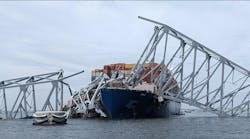“At the end of the day, we produce a PC just like someone else produces one of their products.”
A few years ago, if a sales guy representing a big name in personal computers would have said such a thing in public he would've been fired. But Dell's v.p. of sales, Bill Popp, said this to me last week and he did it while sitting next to Dell's executive director of manufacturing services, Mike Morrison. Mike not only didn't get upset, he agreed with Bill.
“We're moving Dell from an IT hardware-focused company to one that focuses on solutions addressing business problems like the profitability of certain products to certain customers around the world,” he said.
I guess Mike's title should have been the tipoff: Manufacturing “Services.” If the 1967 movie “The Graduate” were to be remade today, that one-word piece of career advice Dustin Hoffman got—plastics—would have to be changed to “Services.” Not that manufacturing is a dead career prospect, but helping manufacturers be more certain in this age of uncertainty seems to be where it's at.
And that's why I was talking to Bill and Mike. Their company just introduced “Dell Product & Profit Analytics,” or DPPA for short. They say DPPA will help manufacturing companies predict the impact market conditions could have on their products. It does so by linking details on material, manufacturing and selling costs from across a manufacturer's supply chain.
So maybe it's not just “Services” that's the new “Plastics,” it's “Logistics Services?”
“With all the issues we had worldwide with natural disasters, logistics has become a major strength and we're bringing tools out to help companies become more profitable, control costs and go to market more efficiently,” Popp said.
Dell is using corporate America's aversion to uncertainty to its advantage. Even in its press release about DPPA it describes this service as a way to “creates powerful ‘what-if' simulations in a safe, sandbox environment. ... The ability to quantify forward-looking scenarios allows decision-makers to take smart action and decide what to stop, what to change and what to grow.”
Dell isn't entering this new phase in its business model alone. It partnered with pVelocity, makers of cost analysis software. In fact another guy in the room, Kang Lu, pVelocity's chief technology officer, told me that not only is the nature of manufacturing changing, but so is supply chain logistics.
Manufacturers have always focused on how to make widgets faster with reduced inventory, he said. The big challenge now is understanding which products they should make, in what mix, and how to target that mix to the right customers at the appropriate price points. That requires looking at supply chain cost and efficiency factors and marrying them with the sales and distribution characteristics of the organization.
So Dell seems to have read the writing on wall street and diversified into the world of logistics service providers. Sounds like a smart move, considering that most of the major third-party logistics providers did pretty well last year. In Dell's vision of success, though, it's more than just about identifying costs, it's breaking them down and analyzing where costs become problems. Many times it's in transportation.
The Dell guys told me about one customer that sourced a liquid product both from Europe and from North America. Even factoring in freight they couldn't figure out why the North-American-sourced product was more profitable than the European one. But by breaking down the costs further they found they were actually shipping diluted product in from Europe, not the concentrated form—which would have taken up less volume and therefore been less costly to ship. A little thing like that changes the profitability of a product significantly.
Forget “The Graduate.” Dell's new business model reminds me more of an old Sherlock Holmes movie—but without the dead bodies.


